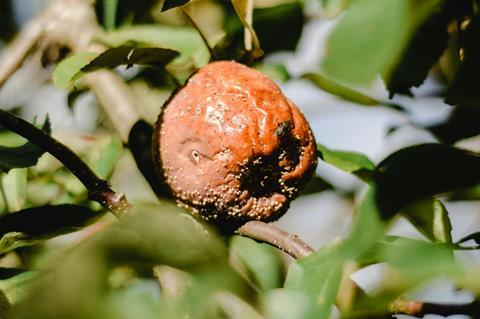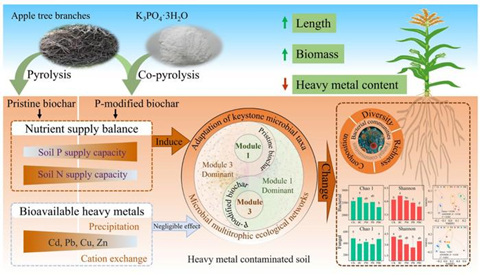Scientists have unveiled a pioneering method that could help farmers reclaim lands blighted by toxic metals and boost the safety of crops grown in contaminated soils. The study, led by a research team in China and published in Biochar, reveals that phosphorus-modified biochar, a carbon-rich material derived from apple tree branches—can dramatically reduce the threat posed by heavy metals in agricultural soils near mining areas.

Heavy metal pollution from industrial activity remains a global threat to food safety, as toxic elements like cadmium and lead can accumulate in crops and enter the human food chain. While traditional biochar has been used to remediate soils, its effectiveness in removing heavy metals has been limited.
READ MORE: New study shows biochar’s electrical properties can influence rice field methane emissions
READ MORE: Biogas slurry boosts biochar’s climate benefits by reshaping soil microbes
Researchers overcame this hurdle by modifying biochar with phosphorus, resulting in a powerful soil amendment that not only immobilizes harmful metals but also improves soil quality.
Polluted soils
In greenhouse experiments, the scientists added the new biochar formulation to heavily polluted soils growing maize. The results were striking: the levels of toxic heavy metals available for plant uptake dropped by over 28%. Cadmium and lead levels in maize grains themselves were reduced by 36% and 62%, respectively. “This indicates real potential to reduce health risks for consumers and livestock,” the researchers noted.

But the innovation goes further. The phosphorus-modified biochar changed the makeup of beneficial soil bacteria and fungi, regulating the soil’s supply of essential nutrients like nitrogen and phosphorus. These changes helped build healthier microbial communities, which are vital for long-term soil fertility and resilience. Interestingly, the reduction in metal toxicity was not the main factor in altering these microbial communities—rather, it was the improved nutrient balance that played the leading role.
Securing food supply
The study’s findings highlight a promising and practical approach for cleaning up heavy metal–tainted farmland and securing the food supply in affected regions. As the team emphasizes, further field trials are needed to confirm the technology’s effectiveness under real-world agricultural conditions.
This work opens new doors for cost-effective, environmentally friendly restoration of polluted soils, offering fresh hope for farmers and communities worldwide.







No comments yet